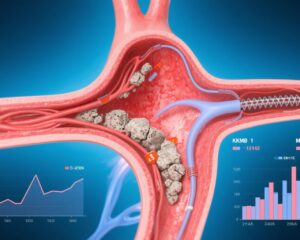Study Background and Disease Burden
Glucagon-like peptide-1 (GLP-1) agonists have emerged as important therapeutic agents with cardiovascular benefits in various disease settings. They have previously demonstrated potential in reducing cardiovascular risk and limiting injury associated with ischemic events. However, their utility during cardiopulmonary bypass (CPB) assisted cardiac surgeries such as coronary artery bypass grafting (CABG) and aortic valve replacement remains uncertain. These surgeries entail significant stress due to ischemia-reperfusion injury and systemic inflammatory responses, often resulting in adverse outcomes including death, stroke, renal failure, or heart failure. Optimizing perioperative management to reduce these complications is a continual clinical challenge, with an unmet need for effective cardioprotective adjunct therapies during CPB.
Study Design
This single-center, randomized, double-blind clinical trial utilized a 2-by-2 factorial design to investigate two interventions simultaneously: oxygenation strategies (liberal FiO2 of 100% vs. restrictive FiO2 of 50%) and infusion of the GLP-1 receptor agonist exenatide versus placebo during and shortly after CPB. The present report focuses on the exenatide intervention. Eligible participants were adult patients undergoing elective CPB-assisted CABG or aortic valve replacement, predominantly with a low-risk profile. Patients received an infusion of 17.4 g exenatide or placebo during CPB and for one hour after weaning from bypass.
The primary composite endpoint was time to the first occurrence of death, stroke, renal failure requiring dialysis, or new/worsening heart failure through a median follow-up period of 5.9 years. Secondary endpoints included predefined adverse events to evaluate the treatment’s safety profile.
Key Findings
The trial analyzed 1,389 patients, with balanced baseline demographics between the exenatide and placebo groups. During the median follow-up of 5.9 years (range 2.5 6.3 years), 170 (24%) patients in the exenatide group and 165 (24%) patients in the placebo group experienced the composite primary endpoint. Statistical analysis showed no significant difference in the timing or incidence of the first major event (hazard ratio 1.0; 95% confidence interval [CI], 0.83 to 1.3; P=0.80). Furthermore, no statistically significant differences were observed in adverse event rates between groups, indicating a comparable safety profile.
Regarding the factorial oxygenation intervention, no difference in outcomes was evident between patients receiving restrictive versus liberal oxygen during and after CPB, though these results are not the focus of this article.
Expert Commentary
Despite prior evidence suggesting cardiovascular benefits of GLP-1 receptor agonists in chronic settings, this trial reports that acute perioperative infusion of exenatide does not confer protection against mortality or major organ failure in patients undergoing elective CPB-assisted CABG or aortic valve replacement. The predominantly low-risk patient cohort may have limited the ability to detect incremental benefits. Furthermore, the relatively short duration of exenatide infusion directly around CPB may contrast with longer-term administration protocols that underlie benefits in chronic cardiovascular disease.
Mechanistically, exenatide’s proposed cardioprotective effects via improved myocardial glucose uptake, anti-inflammatory effects, and ischemia-reperfusion injury reduction might require sustained exposure or combination with other strategies to manifest in this surgical context. The findings align with the complex interplay of factors driving postoperative complications, which may necessitate multi-targeted interventions beyond GLP-1 receptor activation.
Future studies might explore different dosing regimens, timing, or patient populations (e.g., higher-risk or diabetic patients) to clarify whether subsets could benefit from perioperative GLP-1 agonist therapy.
Conclusion
This rigorously conducted randomized, double-blind trial shows that exenatide infusion during cardiopulmonary bypass and the immediate post-bypass period does not reduce the incidence of death, stroke, renal failure requiring dialysis, or new/worsening heart failure among low-risk patients undergoing elective coronary artery bypass grafting or aortic valve replacement. The safety profile was comparable to placebo, supporting the intervention’s tolerability but not efficacy in this setting.
These results suggest that routine use of exenatide for cardioprotection during CPB may not be warranted in similar patient populations. Clinicians should continue to rely on established perioperative management strategies and await further evidence to define the role of GLP-1 agonists in cardiac surgical care.
References
Kjaergaard J, Møller CH, Wiberg S, et al. Efficacy of the Glucagon-Like Peptide-1 Agonist Exenatide in Patients Undergoing CABG or Aortic Valve Replacement: A Randomized Double-Blind Clinical Trial. Circ Cardiovasc Interv. 2025 May;18(5):e014961. doi: 10.1161/CIRCINTERVENTIONS.124.014961. Epub 2025 Apr 23. PMID: 40265262.



